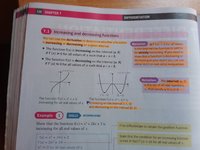My dought is that we know that for a increasing function dy/dx is greater than 0 and for a decreasing one dy/dx is less than 0. But in the edexcel maths book it says a function is increasing when dy/dx is greater than OR EQUAL TO 0....and decreasing when it is less than OR EQUAL TO 0....iam confused....which one is correct??
You are using an out of date browser. It may not display this or other websites correctly.
You should upgrade or use an alternative browser.
You should upgrade or use an alternative browser.
Increasing and decreasing functions differentiation
- Thread starter Vikash
- Start date
Steven G
Elite Member
- Joined
- Dec 30, 2014
- Messages
- 14,561
I totally agree with tkhunny.
To make the statement in your textbook true you need to replace increasing with non-decreasing and decreasing with non-increasing.
The amusing part is that the book is saying that it is both increasing and decreasing when dy/dx = 0 when in fact it is doing neither. It really is total rubbish.
To make the statement in your textbook true you need to replace increasing with non-decreasing and decreasing with non-increasing.
The amusing part is that the book is saying that it is both increasing and decreasing when dy/dx = 0 when in fact it is doing neither. It really is total rubbish.
Thanks ??So, it's increasing AND decreasing when the derivative is 0? Rubbish! No need to be confused. Simply discard foolishness when you encounter it.
Dr.Peterson
Elite Member
- Joined
- Nov 12, 2017
- Messages
- 16,618
It's just possible that they are saying something slightly different from what it appears to be. Please quote exactly what it says (the whole paragraph, or even an image of the page), so we can be sure. Textbooks can be wrong, but it's unlikely to be this wrong; and I know of at least one way in which you could be misreading what they say.My dought is that we know that for a increasing function dy/dx is greater than 0 and for a decreasing one dy/dx is less than 0. But in the edexcel maths book it says a function is increasing when dy/dx is greater than OR EQUAL TO 0....and decreasing when it is less than OR EQUAL TO 0....iam confused....which one is correct??
here it isIt's just possible that they are saying something slightly different from what it appears to be. Please quote exactly what it says (the whole paragraph, or even an image of the page), so we can be sure. Textbooks can be wrong, but it's unlikely to be this wrong; and I know of at least one way in which you could be misreading what they say.
Attachments
Yes sir??So, it's increasing AND decreasing when the derivative is 0? Rubbish! No need to be confused. Simply discard foolishness when you encounter it.
Dr.Peterson
Elite Member
- Joined
- Nov 12, 2017
- Messages
- 16,618
It's exactly as I expected. They have said nothing wrong here, and there is no "rubbish", as long as you read it correctly:here it is

This doesn't say that a function is increasing at any point where the derivative is nonnegative; it is talking about increasing on an interval over which the derivative is nonnegative. It would be more helpful if they first gave the full definition of "increasing on an interval", which does not involve the derivative; their definition misses the fact that a function can be increasing on an interval in which the derivative does not always exist. But they do make a helpful comment about strictly increasing functions, and allow you to use that instead (using non-inclusive "<").
I have written about this issue on my blog, here.

